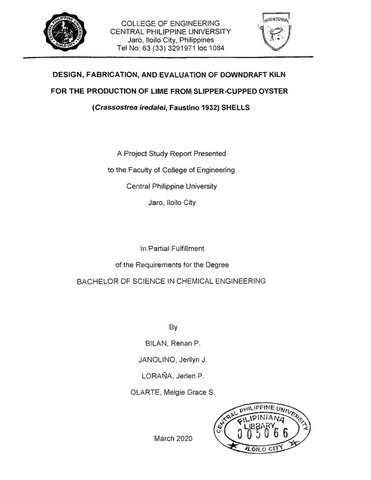Design, fabrication, and evaluation of downdraft kiln for the production of lime from slipper-cupped oyster (Crassostrea iredalei, Faustino 1932) shells

Page views
791Date
2020-03Thesis Adviser
Defense Panel Chair
Share
Metadata
Afficher la notice complète
Résumé
Slipper-cupped oyster shell contains 95% calcium carbonate and is considered as a promising source of lime in the future. This study aimed to design, fabricate, and evaluate a downdraft kiln to produce lime from Slipper-cupped oyster shells. Three kilograms of shells were calcined at 200 °C for 30, 60, and 90 minutes, respectively, with 50 °C increment up to 500 °C which was the highest temperature the kiln had withstood. Calcined shells were powdered using LA Abrasion equipment for 150 seconds and the products obtained were characterized by particle size distribution using the Standard Tyler Sieve and calcium oxide content analysis conducted by the Regional Feed Laboratory. The results for particle size distribution showed that at temperature of 300 °C and residence time of 60 minutes, particle sizes smaller than 0.3 mm is 55.66 percent of the total mass which is greater compared to other trials.
The results for percent calcium oxide (CaO) showed that the optimum operating temperature and residence time of the downdraft kiln in calcining Slipper-cupped oyster shell must be at a temperature of 400 °C and residence time of thirty (30) minutes to produce 54.726 % CaO can be considered already a very high-quality lime. Percent CaO of other trials is also greater than 50% and can also be categorized as high-quality lime.
Description
Special paper abstract
Suggested Citation
Bilan, R. P. , Janolino, J. J. , Loraña, J. P. & Olarte, M. G. S. (2020). Design, fabrication, and evaluation of downdraft kiln for the production of lime from slipper-cupped oyster (Crassostrea iredalei, Faustino 1932) shells (Unpublished special paper). Central Philippine University, Jaro, Iloilo City.
Type
Special paperDepartment
College of EngineeringDegree
Bachelor of Science in Chemical EngineeringPhysical Description
xii, 115 leaves

